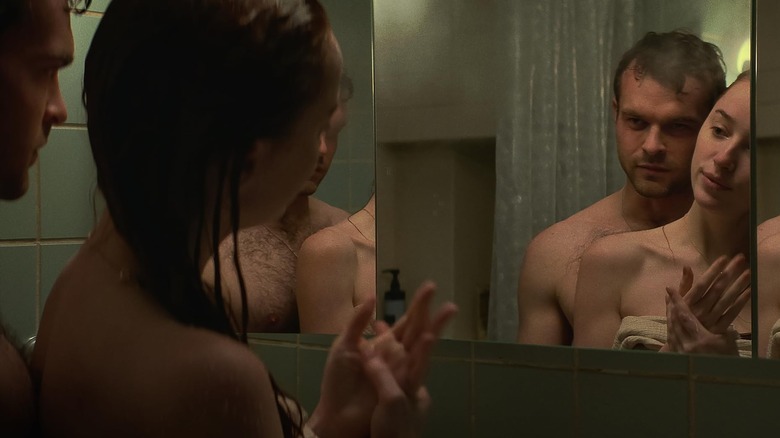The Erotic Thriller That Has Netflix's Number One Spot On Lockdown
As sexless tentpoles have taken over the box office and online discourse has people asking if sex is "necessary" in movies (whatever that even means), the erotic thriller has nearly gone extinct. Even "Fatal Attraction" and "Unfaithful" director Adrian Lyne was only able to breathe so much life back into the fading sub-genre when he came out of semi-retirement to direct last year's "Deep Water," a straight-to-streaming release that drew respectable viewership despite lukewarm reviews. Enter first-time feature director Chloe Domont with her critically acclaimed festival hit "Fair Play," a film that's arrived just in time to give steamy mid-budget adult cinema a much-needed shot in the arm.
Phoebe Dynevor and Alden Ehrenreich star in Domont's thriller (which she additionally wrote) as Emily and Luke, a pair of ambitious young hedge fund analysts who, unbeknownst to their company's bosses, are secretly dating. However, when Emily is promoted over Luke, it deals a fatal blow to the latter's fragile ego, causing Luke to try and undermine Emily in increasingly aggressive ways and gradually shattering their romantic bliss. What ensures is a dynamite showcase for not just Dynevor (she of "Bridgerton" fame) and Ehrenreich (who, thanks to this and "Oppenheimer," has regained the career momentum he had prior to starring in the box office flop "Solo: A Star Wars Story"), but also Domont, who refrains from taking a totally one-sided approach to this story or shying away from Emily's own darker inclinations.
It's not just critics who are entranced. According to Netflix viewership aggregator FlixPatrol, "Fair Play" was the number one film on the streamer in the U.S. over its first weekend of streaming and has broken into the service's top 10 the world over. Unsurprisingly, the film is also stirring up conversations over its provocative subject matter (as well it should).
'This isn't really a film about female empowerment'
"Fair Play" is like an oasis of water in a desert of sex-averse modern mainstream films, using Emily and Luke's sex life to illustrate the increasingly fraught and ultimately violent turns their relationship takes over the course of the film (starting with an opening scene that's refreshingly sex-positive about period blood). Not just that, the story Domont is telling here is reasonably hitting hard for anyone — but, yes, especially women — who have ever been in a relationship with a man who simply cannot handle the idea of their partner being more successful than them.
In an interview with Entertainment Weekly about the film's ending (beware of spoilers, those you click that link), Domont admitted that her script was (naturally) "much more one-sided toward Emily" starting out. Wisely, though, she came to realize that "the much more interesting version of the film was a little bit more gray, one that does go back and forth up until a certain point." Even then, "Fair Play" avoids painting Emily as an entirely sympathetic figure, with the character matter-of-factly stating at one point that she didn't pursue a career on Wall Street under some misguided notion of being a hero. "This isn't really a film about female empowerment. This is a film about male fragility," as Domont put it.
A powerfully acted and carefully crafted original movie geared towards adults that grapples with topical material in a nuanced and complicated yet entertaining fashion? "Fair Play" may not be a perfect film (its third act is admittedly guilty of tossing in one too many melodramatic flourishes compared to what comes before it), but it is a rare specimen these days and one that absolutely merits your attention. You can stream it now exclusively on Netflix.

